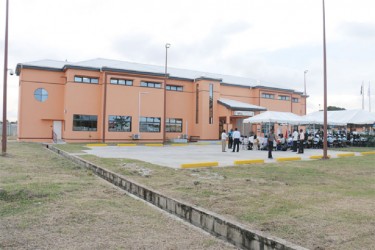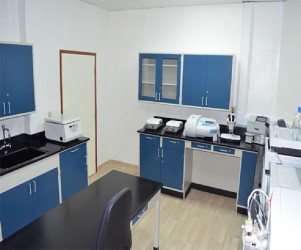After years of serial unsolved crimes, the investigative capacity of law enforcement is expected to be boosted with the opening of the long-awaited Guyana Forensic Science Laboratory.

The $1.049 billion project which was funded by the Inter-American Development Bank (IDB) was commissioned yesterday and in addition to conducting a broad range of tests, a section of the sprawling 12, 000-ft complex will be used as a training ground for science students of the University of Guyana.
The IDB has been approached about the inclusion of DNA testing at the facility.
Minister of Home Affairs Clement Rohee in his address to the sizeable gathering thanked the University for providing the land on which the building has been constructed. He said that of critical importance was the credibility of the lab, the evidence it produced and the fact that it needed to be built on neutral ground. It was through negotiation that the government, he said, managed to secure a section of the Turkeyen campus.
He said that the university “was able to negotiate that the lab be used as a training ground for young scientists in the field of forensics.” He said that there is a special section located within the building for these students.
He added that qualified staffing and under whose supervision the facility should fall were issues of concern. Rohee stated that it was later decided that the lab would fall under the supervision of the Ministry of Home Affairs.
The minister stated that the lab will aim to use scientific techniques in solving crimes “that we have not seen in the history of crime solving in our country before.” He added that the use of these techniques is all part of a system in keeping with international best practices.
Rohee assured that the lab will not be another white elephant. He said that they have also discussed the question of the clientele of the laboratory in order to formulate a business plan to ensure that at every stage of its development it is active and “taking business in order to drive its professionalism.” The lab, he stressed is expected “to be a revenue stream for the government of Guyana” adding that the various scientific tests will be offered to clients locally and at a later stage internationally.
He said the facility is outfitted with “state-of-the-art” equipment including highly specialized systems which will keep track of all evidence submitted for analysis.

He said that the lab will specialize in testing toxic substances, narcotic drugs, pharmaceutical drugs, alcohol, forged documents and biological fluids. He said that based on a mandate given by the president and the cabinet the ministry has been tasked with working to introduce some elements of laboratory DNA testing at the facility.
Rohee said that in the years to come what would be of critical importance is the adherence to international standards. He said that Guyana has now joined the family of forensic labs in the Caribbean, adding that steps have already been taken to establish contact with laboratories around the world in order to facilitate the exchange of experiences, information and training of the staff.
He described the commissioning as “a proud moment.”
The construction of the lab falls under the Citizens Security Programme (CSP). The programme coordinator Anil Ramnath in giving an overview of the project stated that the ground floor houses the administrative offices, library and research area, conference room, security monitoring, evidence submission room and washroom. The top flat, he explained, accommodates four departments: chemistry, toxicology, document and evidence trace. These, departments he went onto explain, had six laboratories and evidence rooms.
Sophie Makonnen, the country representative of the IDB in her remarks said the collaboration between the Government of Guyana and the IDB started three years ago. She said that one of the findings of that milestone collaboration was the limited capacity of the police to hear complaints and for the court to successfully prosecute cases.
She said that the lack of appropriate and effective handling as well as processing and analysis of evidence was one main weakness in the successful prosecution of cases.
Head of the Presidential Secretariat Dr Roger Luncheon said in his feature address that the construction of the lab is further evidence of national development coming out of the 2006-2011 period when former president Bharrat Jagdeo held office. He said that this national institution can generate interest on the local and international scenes.
The building was constructed by Courtney Benn Construction Company. Trinidad-based firm Western Scientific installed the forensic equipment.
Senior members of the disciplined services including acting police commissioner Seelall Persaud and Crime Chief Leslie James and Fire Chief Marlon Gentle, Chancellor of the University of Guyana Jacob Opadeyi and officials of the Diplomatic Community were also in attendance.





